Fighting PFAS
Air Date: Week of April 25, 2025
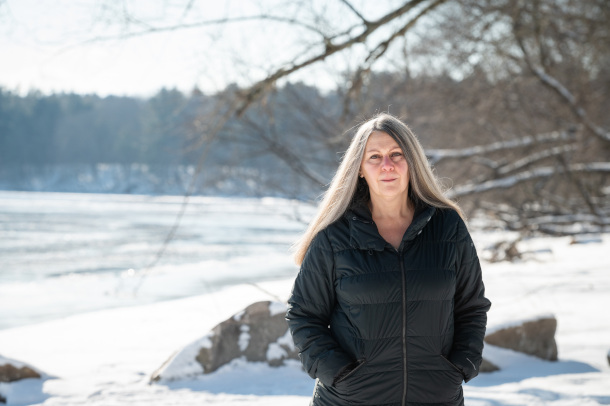
Laurene Allen is the 2025 Goldman Environmental Prize winner for North America. She lives in Merrimack, New Hampshire. (Photo: Goldman Environmental Prize)
Laurene Allen moved to Merrimack, New Hampshire to raise a family in the 1980s. Little did she know that, in 2016, the state would reveal that her town’s water supply was contaminated with high levels of PFAS, or forever chemicals, leaked by a nearby plastics plant. Laurene organized a grassroots campaign to expose widespread health harms in her community linked to those chemicals, and the plant eventually shut down. She has been recognized with the 2025 Goldman Prize for North America. Laurene Allen joins Host Steve Curwood to share her story.
Transcript
BELTRAN: It’s Living on Earth, I’m Paloma Beltran.
CURWOOD: And I’m Steve Curwood. Laurene Allen moved to Merrimack, New Hampshire to raise a family in the 1980s. Little did she know that, in 2016, the state Department of Environmental Services would reveal that the town’s water supply was contaminated with high levels of PFAS, or forever chemicals, leaked by the nearby Saint Gobain Performance Plastics Plant. A social worker by training, Laurene became a self-taught expert in PFAS compounds and led a grassroots campaign to expose widespread health harms in her community linked to those chemicals. Laurene Allen won the 2025 Goldman Prize for North America for her activism, and she joins us now. Welcome to Living on Earth, Laurene, and congratulations!
ALLEN: Oh, thank you so much. It's an honor to be here.
CURWOOD: It's an honor for us to have you. So Laurene, tell me about the moment when you learned that the water in your hometown of Merrimack, New Hampshire, was contaminated with PFAs chemicals coming from the Saint Gobain Plastics Plant. How did you feel when you learned that these chemicals were in your community?
ALLEN: Well, I'm a clinical social worker, and in my work, I'm kind of out of the equation. So my first reaction was the responses to people who were coming forward in an information meeting and sharing their private business, basically. And New Hampshire, folks don't do this. They're self revealing and self disclosing patterns in health, and they're ending over and over and over by saying, do you think it could be the water? Now there isn't a state or public health official anywhere that will say, yes, we think it could be the water. But I'm listening to people, and I'm watching them walk away, and I'm really feeling for them. They're depleted, they're hurting, and I'm seeing a pattern emerge. So before I thought about patterns around me and my neighborhood and my health and my concerns, I was thinking about the community as a whole. My brain went really big, really fast, and I said, something isn't right here.
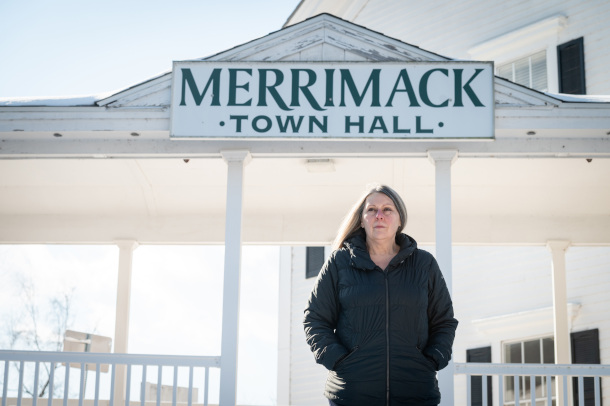
Laurene led a grassroots campaign to address PFAS water contamination in her community of Merrimack, New Hampshire. (Photo: Goldman Environmental Prize)
CURWOOD: So who called this meeting and what was going on there?
ALLEN: The state of New Hampshire, and I saw little bits about the investigation that was really contained. And I think that's how it goes in investigations like this, they look as little as possible, and there was a lot of denial. There was this major effort to keep exposure and outcome really far apart. I kept hearing the phrase, these are emerging contaminants. We've just discovered them. We really don't know much about them. You know, learning since then that, you know, there's an awful lot known about these chemicals. Turns out that they are highly toxic, highly hazardous substances that somehow evaded hazardous substance and toxicity labels for decades. You know, that's infuriating. That's not okay. You know, that's a sense of justice and deception, and all these people who came up to the microphone, nobody validated them.
CURWOOD: So Laurene, you trained as a social worker. I don't imagine you have a whole lot of background in chemistry or environmental studies, or at least before this, but now you are, in fact, one of the nation's experts on PFAS contamination. How did you go about teaching yourself about these chemicals and what motivated you to keep going?
ALLEN: I realized quickly that people in an impacted community such as this are speaking from emotion. They're speaking their truth, they're telling their stories, and they are very emotional and they're very hurt. And that isn't enough to sway the system, is what I quickly realized. And I said, hmm, we need to become our own experts. We need to learn how to talk at a high level, so people realize we know what we're talking about, so we can refute the pat on the back, it's safe. Your exposure is, quote, relatively low. You're not like this other community. You know, we were told these things. The minimization, the denial, it was not acceptable. So we became our own experts. I used an iPad at night, you know. I was never one to take electronics to bed with me. And I'd have something in my mind after work, and about 930 I'd get to it, and I'd start researching and reading investigation documents and reading health studies and reading things from other countries, avidly consuming. There would become a time where I'd look at the clock and I'd say, you really need to go to bed, because in my profession, you need to take care of yourself. You're there for clients the next morning. And, you know, just saying, well, I'll just read one more study. It became, at that point, you know, I thought, what is going on here? It's compulsive behavior. Looking back, I realized at one point, it's a trauma response, you know, it really, really is.
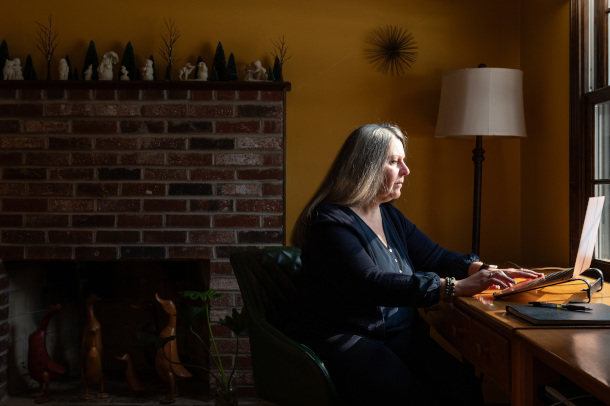
Trained as a social worker, Laurene became a self-taught expert in PFAS chemicals. (Photo: Goldman Environmental Prize)
CURWOOD: So from your studies, what did you learn about the health risks associated with PFAS, or these so-called forever chemicals? What makes them so concerning? To what extent have you seen them in your community there, in and around Merrimack, New Hampshire?
ALLEN: Well, in doing my research, I found out that PFAS are part of the endocrine disruptor category of chemicals, aside from being carcinogens and toxic. So our endocrine system is everything, right? It keeps us healthy. It keeps us in balance. If that's out of whack, we're in trouble. You know, you can find graphics online now that have been created showing the human body, in males and females both and you'll go through every system of the body: the nervous system, the cardiovascular system, reproductive health is highly disrupted, neurodevelopmental changes, autoimmune disruptions, you know, cholesterol impacts, lipids, liver enzymes and kidney impacts. This is a chemical that does not break down, and your body excretes all kinds of things every day. Your body doesn't know what to do with this to break it down, to excrete it. So your elimination organs are very, very impacted, on and on and on it goes. So the research was kind of mind blowing at that point, because I. Was finding study after study showing harm, and I was being told by the folks that are there to guide us that there's no evidence, there's no research, and there's no science. If I can find information on a Google search on a cell phone, and people whose jobs it is that we turn to are saying we just don't know and we don't have any science, not some science and limited, you know, that was a real disconnect there.
CURWOOD: So what if any health effects for you or your family or friends did you become aware of after this?
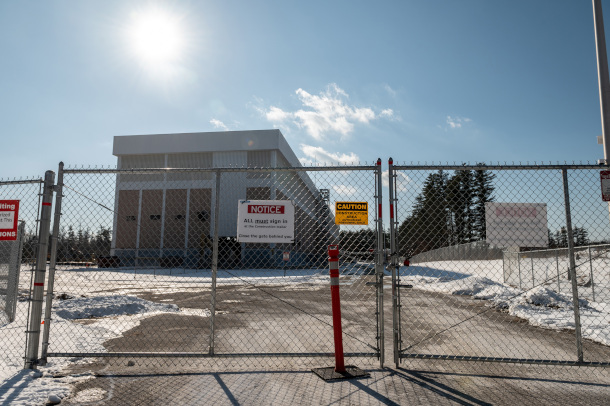
The manufacturing processes of the Saint Gobain Performance Plastics plant were releasing PFAS into Merrimack and surrounding communities for years. The plant announced its plan to close its doors in August 2023 (Photo: Goldman Environmental Prize)
ALLEN: What I saw that meeting initially, was a lot of people with kidney cancer, bladder cancer, breast cancer, which took a number of years to have acknowledged as PFAS related. And I heard about thyroids, thyroids that were disorders, thyroids that had cancerous nodules, thyroids that had been removed in 14 year olds. So that was just the beginning of it. And in 2017 when everybody was telling us, you know, nothing to see here, folks, basically, I decided that we were going to try to collect our health data and bring it to the state. So I went door to door. I found people who were vocal, who I never knew before this journey, and I kind of messaged them all on Facebook Messenger, of all places. And I said, hey, where do you live? Could I come by and bring you some flyers? And would you be willing to give these out with a link to your neighbors? And no one wants to go to door to door in my community, you know, it's very intimidating, and bit by bit, there were people who gradually became part of my citizens group. And we distributed all over town. We put it in a library, in the town hall and in the paper so everybody could come in there and report health issues. So we took it to the state, and of course, we were told this isn't very scientific, and it was as scientifically done in terms of methodology and sampling as a person could do with no budget. But it was really dismissed. At that point we asked them to do a cancer incident report. They did. It was inadequate, and we finally, after two years, got a commitment to redo it. Recently, we have partnered with Dartmouth University to analyze this properly, and they have verified that there's a 62%, you know, statistically significant higher rate of kidney cancer. That's what you're going to see with PFOA, unfortunately.
CURWOOD: So taking on the powerful plastics industry is no easy feat these days. So what did you do to fight back against the Saint Gobain Plastics plant and rally your community to take on this issue of PFAS?
ALLEN: So what I did is it was very clear that what their strategy was is to keep the focus on the past, to say, oh, we really didn't know these problems were there, and we followed the law, and they were omitting what they had transitioned to. So when you phase out, PFOA and PFOS, which industry did, to some extent, by 2015 you change your practices, and you think you can sail off into the sunset, and we're, quote, safe. In fact, you're spewing from 13 unfiltered stacks all of the replacement chemicals for PFOA, which are horrific. So every meeting, over and over and over, I stood up and made sure when they talked about PFOA and PFOS, I would rattle off nine to 12 other ones, and said they are all present. Count them all. You cannot talk about the past only. Now, these formulas that they use are all confidential business information. Nobody's supposed to know what they are. But I did find out what they are. I tracked down that they were made in Chemours in North Carolina, shipped up here and used. I spoke about it freely and openly everywhere I went, and they weren't going to get away with disregarding the elephant in the room, which is the current cocktail of poison.
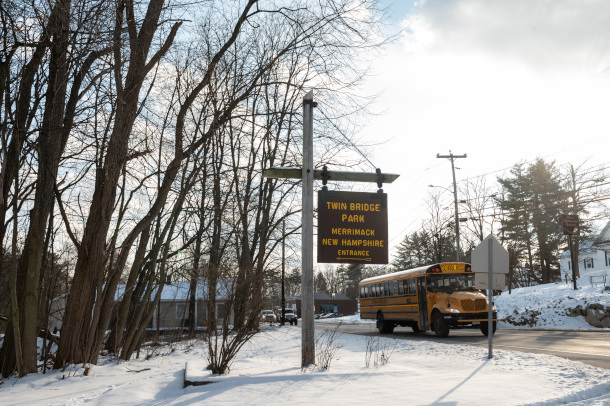
Laurene helped organize community health surveys showing widespread health harms associated with PFAS among Merrimack residents, including kidney cancer, bladder cancer, breast cancer, and thyroid issues. (Photo: Goldman Environmental Prize)
CURWOOD: To what extent did they cast aspersions on your mission, though? I mean, usually people trying to conduct reform get labeled as crazy or out there, or left or right or whatever. What happened to you?
ALLEN: Oh, I was called a fear monger and a crazy lady in the beginning of this, and someone waved his finger in my face, who was in an elected position publicly on camera. The video still exists, I'm sure, and looked at me over his glasses and said, do not use the word, "contamination." It's inflammatory language. And I smoothly said, at that moment, I do not care for that word myself. But like it or not, we are an EPA designated contamination investigation, the biggest investigation in all of New England. I said, I love it here. I moved here for the same reasons as you did. This is horrific. That is not my word. The very next day, the website changed, and they took out the EPA contaminated investigation language, and it said, "investigation into the presence of perfluoral alkali substances," and sanitized it. So, you know, many, many things were said. So another thing I would do is when I saw someone in our town council, or someone that I felt needed better ammunition than they were getting from industry lobbyists, because that's where they were getting information, is having a coffee with them and bringing them documents that I highlighted, and they said, where are you getting this? We get weekly updates. We don't know any of this. And I'd say this is the investigative documents that's stored on the state's website. It's very difficult to delve into it, but I'm giving them to you in a pack and highlighting things that are not okay, even with people who were really terrible to me. You know, when you meet a person and they're really distasteful and they feel harmful to you, you just nod and walk away, and I'm thinking, they don't know, and they need to know, because they're a person, too, and they've been drinking the water. They need to know this. So my compassion, I think, really overrode what was coming at me, and I wasn't personalizing it.
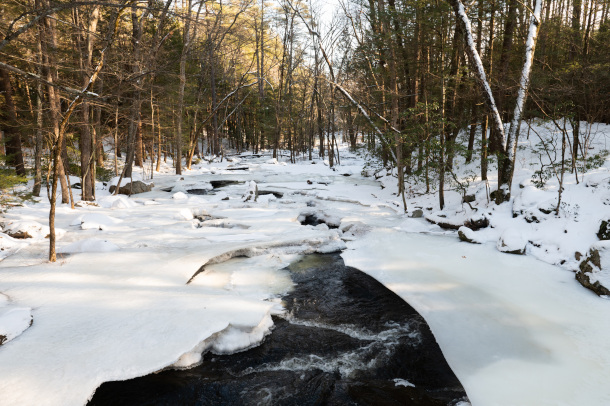
Laurene says more research is needed to document the full scope of environmental and health impacts from PFAS contamination. (Photo: Goldman Environmental Prize)
CURWOOD: Laurene, what were the results of your years-long campaign against the PFAS contamination there in Merrimack, New Hampshire? I mean, today, to what extent has the community been protected?
ALLEN: Well, we haven't been protected, but we've made gains. Basically, we took this really fiscally frugal state, and we convinced the residents that there was enough of a problem that 93% of taxpayers voted to remediate all of our public wells at our own cost, with the hopes that we would get justice and be reimbursed for that at some point. That is unheard of, 93% vote, and that is how well educated people have been and how they concluded that the water was not safe. We've established a grant program for all of New Hampshire, just not Merrimack, under some Biden infrastructure dollars that were specifically earmarked to PFAS, first in the nation, all private well owners whose well tests above 12 parts per trillion of PFOA, which is now four parts, will receive a $5,000 grant to filter, properly filter, their wells. So that was huge. We have successfully got air permitting when it comes to PFOA in rule making. So Saint Gobain needed to filter their air stacks. You know, what we have accomplished is more in the regulatory which is huge for New Hampshire.
CURWOOD: And what's happened to the company, Saint Gobain?
ALLEN: Saint Gobain, shortly after being approved for their air permit for the next five years, really surprised people when they announced that they were going to reorganize and close this facility. I know that they realized that we weren't ever going to stop, we aren't ever going to go away. They had been banking on hiding in New Hampshire and no eyes upon them.
CURWOOD: So Saint Gobain has gone away, they left Merrimack. But what's left behind? Usually, these kind of chemical manufacturers leave a fair amount of residue. What's been done to take away any further toxic danger?
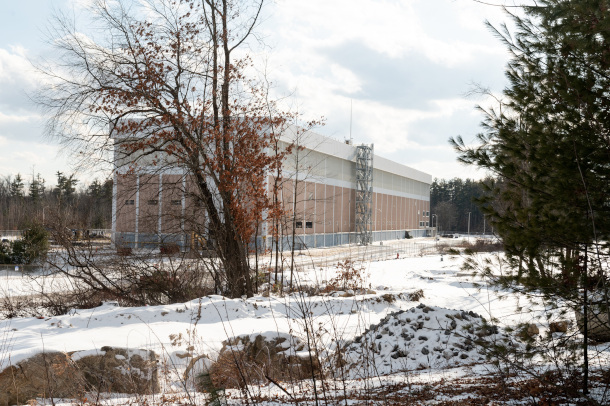
While the Saint Gobain plant shut down its operations in Merrimack in May of 2024, Laurene claims its cleanup efforts do not adequately address contamination. (Photo: Goldman Environmental Prize)
ALLEN: A highly, highly contaminated site that just recently was acknowledged by the state of New Hampshire as having an inadequate remediation plan that took two years for them to say those words. We haven't succeeded in really protecting the environment because the site cleanup plan is that's being proposed as a joke. It does nothing. The soil, the groundwater, the river, the fish, the livestock, that's never been looked at. So they'll leave behind a forever impact on the community, right? The forever chemical that never goes away.
CURWOOD: Laurene, before you go, what gives you hope?
ALLEN: What gives me hope is the people. You know, the people who are so remarkable that they've stepped up and they've stood shoulder to shoulder, and we have propped each other up. And it's real easy to be fearful and to hide and say, I can't deal with this, but people give me hope. I believe in people, regular people, can do amazing things when they work smart and they work together.
CURWOOD: Laurene Allen is the 2025 Goldman Prize winner for North America. Laurene, congratulations and thanks for taking the time with us.
ALLEN: Thank you so much.
Links
The Goldman Environmental Prize | “Laurene Allen”
Sierra Club | “PFAS (Perfluoroalkyl and Polyfluoroalkyl Substances)”
Follow Laurene Allen on Bluesky
Living on Earth wants to hear from you!
Living on Earth
62 Calef Highway, Suite 212
Lee, NH 03861
Telephone: 617-287-4121
E-mail: comments@loe.org
Newsletter [Click here]
Donate to Living on Earth!
Living on Earth is an independent media program and relies entirely on contributions from listeners and institutions supporting public service. Please donate now to preserve an independent environmental voice.
NewsletterLiving on Earth offers a weekly delivery of the show's rundown to your mailbox. Sign up for our newsletter today!
 Sailors For The Sea: Be the change you want to sea.
Sailors For The Sea: Be the change you want to sea.
 The Grantham Foundation for the Protection of the Environment: Committed to protecting and improving the health of the global environment.
The Grantham Foundation for the Protection of the Environment: Committed to protecting and improving the health of the global environment.
 Contribute to Living on Earth and receive, as our gift to you, an archival print of one of Mark Seth Lender's extraordinary wildlife photographs. Follow the link to see Mark's current collection of photographs.
Contribute to Living on Earth and receive, as our gift to you, an archival print of one of Mark Seth Lender's extraordinary wildlife photographs. Follow the link to see Mark's current collection of photographs.
 Buy a signed copy of Mark Seth Lender's book Smeagull the Seagull & support Living on Earth
Buy a signed copy of Mark Seth Lender's book Smeagull the Seagull & support Living on Earth

